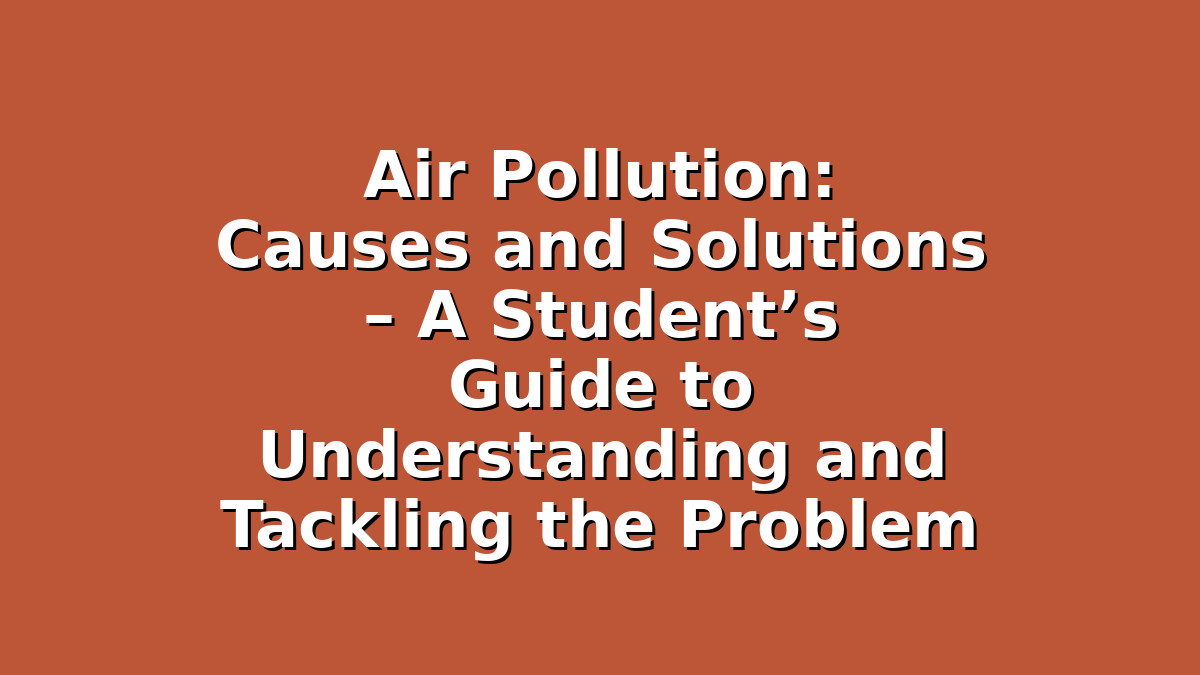Air pollution is one of the most pressing environmental issues of our time. As students preparing for exams or trying to improve your study habits, understanding air pollution can be both an insightful academic topic and a way to connect what you learn with real-world problems. Not only does air pollution affect our environment, but it also impacts our health, concentration, and overall well-being — all critical factors when you’re aiming for academic success. In this blog, we’ll explore the causes of air pollution, its effects on students like you, and practical solutions you can apply both in your studies and in daily life to contribute toward cleaner air.
Understanding Air Pollution: What Are the Causes?
Before diving into study tips and solutions, it’s essential to grasp what air pollution is and why it happens. Air pollution occurs when harmful substances such as gases, particles, and biological molecules contaminate the atmosphere. These pollutants can come from natural sources, but most air pollution is caused by human activities.
1. Industrial Emissions and Fossil Fuels
Factories, power plants, and vehicles release large amounts of pollutants like carbon monoxide (CO), sulfur dioxide (SO2), nitrogen oxides (NOx), and particulate matter (PM) into the air. Burning fossil fuels such as coal, oil, and gasoline produces these emissions. For students, understanding these causes can help in subjects like science, environmental studies, and geography.
2. Deforestation and Agricultural Practices
Cutting down trees reduces the natural ability of the environment to absorb carbon dioxide (CO2), a major greenhouse gas. Additionally, agricultural activities release methane (CH4) and ammonia (NH3), which contribute to air pollution. These factors show the link between human choices and environmental consequences.
3. Household Pollutants
Even activities at home, such as using certain cleaning products, burning wood or coal for cooking and heating, and smoking, contribute to indoor air pollution. For students, this highlights the importance of studying not just outdoor air quality but indoor air quality as well.
Study Tip: When preparing for exams, try to connect these causes to real-life examples or local issues in your area. Creating mind maps or flashcards about different pollution sources can make it easier to remember.
How Air Pollution Affects Students and Study Performance
Air pollution isn’t just an environmental problem—it directly impacts your health and study efficiency. Understanding these effects can motivate you to adopt healthier habits and advocate for cleaner air.
1. Health Issues Impacting Concentration
Exposure to polluted air can cause respiratory problems, headaches, fatigue, and allergies. When your body is dealing with these issues, it’s harder to focus during long study sessions or exams. For example, asthma triggered by poor air quality may cause frequent disruptions in your study routine.
2. Cognitive Impairment
Recent research suggests that long-term exposure to air pollution can affect brain function, lowering memory and attention spans. This is crucial information for students because it underscores how environmental health is directly tied to academic performance.
3. Emotional and Mental Well-being
Poor air quality can lead to increased stress and anxiety, which are already common among students. Managing mental health is key to effective studying, so staying aware of how air pollution influences your mood can guide you in seeking healthier environments.
Study Tip: To enhance your study efficiency, try to study during times when air pollution levels are lower, such as early mornings. Use apps or websites that track local air quality indexes (AQI). Also, incorporate short breaks with deep breathing exercises or outdoor walks in cleaner areas to refresh your mind.
Practical Solutions Students Can Adopt to Combat Air Pollution
While solving air pollution is a huge global challenge, students can play an essential role by adopting simple yet impactful solutions. These actions not only help the environment but also create better conditions for learning and living.
1. Use Eco-Friendly Transportation
Instead of relying on cars or motorbikes, opt for walking, cycling, or public transportation when possible. Not only will this reduce your carbon footprint, but physical activity like cycling can boost your energy and concentration for studying.
2. Promote Awareness and Community Involvement
Start or join school-based environmental clubs or campaigns focused on air pollution. Organizing awareness drives, tree-planting events, or clean-up days can be rewarding and help reinforce your learning. Teaching others what you know also deepens your understanding.
3. Improve Indoor Air Quality
Keep your study area well-ventilated and clean. Use houseplants known for purifying air, avoid smoking indoors, and minimize the use of chemical-based cleaning products. Creating a fresh and healthy environment will improve your focus and reduce health risks.
4. Adopt Sustainable Study Habits
Choose digital notes over printing large volumes of paper, turn off electronic devices when not in use, and recycle old study materials. These small habits contribute to overall environmental care and demonstrate responsible behavior.
Study Tip: Set realistic goals for incorporating these changes gradually. For example, start cycling to school twice a week or commit to organizing one awareness event per semester. Tracking your progress in a journal can keep you motivated and accountable.
Conclusion
Air pollution is a complex issue with far-reaching consequences on our environment and health, especially for students preparing for exams. By understanding its causes, recognizing how it affects your study performance, and adopting practical solutions, you can make a meaningful difference. Remember, every small step counts—whether it’s choosing clean transportation, improving your study environment, or spreading awareness among peers. Stay curious, stay proactive, and use what you learn not just to excel academically but to help build a healthier world for yourself and future generations.
Keep pushing forward in your studies and remember that learning about important topics like air pollution equips you with the knowledge to make informed choices. You’ve got this!

Responses